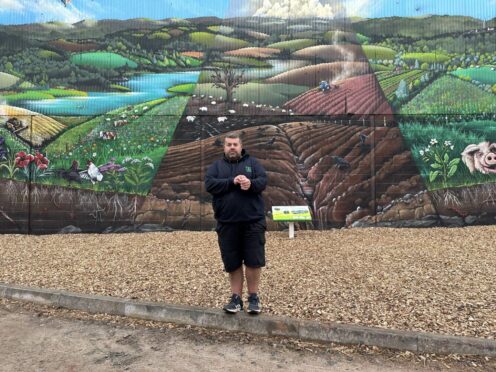During my career, I have visited many hundreds of farms all over the world and there are commonalities wherever they are and whoever you meet – the challenges of reacting to the weather, turning a profit and the joys of a benign season, or achieving high yields.
Over recent years I’ve seen something different, and too many cases to be coincidental, which is that mental health struggles have triggered many farmers into changing to regenerative farming. They say that the journey has helped them fall back in love with farming and embrace life again.
Regenerative farming has become a buzzword for what is simply farming for the soil, caring for it and bringing more life to it. The five principles are minimal soil disturbance, keeping the soil surface covered, ensuring living roots in the soil, growing a diverse range of crops, and bringing grazing animals back to the land.
Ben Taylor-Davies is one of these stories, he farms Townsend Farm, near Ross-on-Wye in Herefordshire. Twelve years ago his family’s life stopped. Ben’s wife, Helen, left their 18-month old son, Jobe, sleeping in his car seat, he managed to release himself and walk across a paddock of horses. One horse kicked the right side of his head, the impact was so severe that, the doctors gave him a 5% chance of survival. 12 years on Jobe is very much alive and is the centre of the busy farming family, he will need care for the rest of his life to deal with the consequences of his damaged brain.
At many farming events, all over the world, Ben talks very openly about his son’s accident and his ensuing journey. His contented life, family of five – he has two daughters, Teagan and Erin – was shattered from busy-ness, working as an agronomist and on his farm, to the time-in-limbo-wait to see if their son would survive. Once the worst was over, Ben says he went into a suicidal meltdown. Knowing he needed to do something to help himself, Helen persuaded him to apply for a Nuffield Farming Scholarship, for which he was accepted. With all his strength he embraced the opportunity which took him over to the United States where he says he met some incredible – and importantly, happy – farmers dedicated to understanding, managing and improving their soils. It was then that he decided he needed to change his life.
Fast forward a decade and his farm is full of life and diversity, and it is turning a very decent profit. He is also working – too much he says! – as a regenerative farming consultant, which takes him all over the world. Their 500-acre farm has pigs, cattle, sheep and poultry, a farm shop, a glamping site and a vineyard – pruned by grazing sheep – that produces wine retailing form £40/bottle. He has recently planted an area of agroforestry where the fruit trees and bushes are in rows, 28-metres apart to allow for arable cropping in between. He has also given building space to a brewery and a kefir maker on site.
He says that the way he now farms, the connections he has made with people looking for his advice, and the joy that the life on his farm brings him, give him a deep sense of happiness. And he’s not alone either. I’m currently working with six farmers who have formed the Green Farm Collective. All are regenerative farmers looking to monetise their biodiversity and their carbon, one of the group, Tim Parton, also cites ‘Regen farming’ as his salvation from mental health challenges.
There are many people who I’ve met who scoff that regenerative farmers are airy, evangelists, not living in a commercial world but, having seen their farms, their business bottom-lines and their contentment, I’d urge those who question it to go and see one of these farms for themselves.
